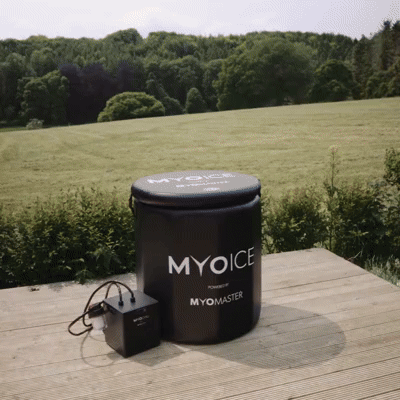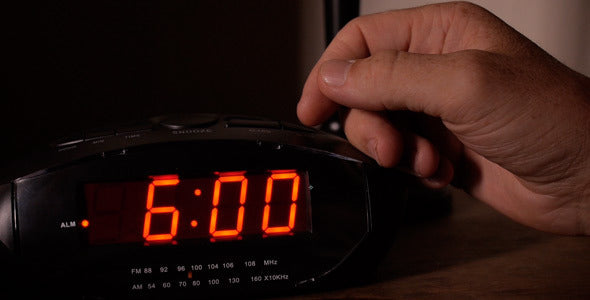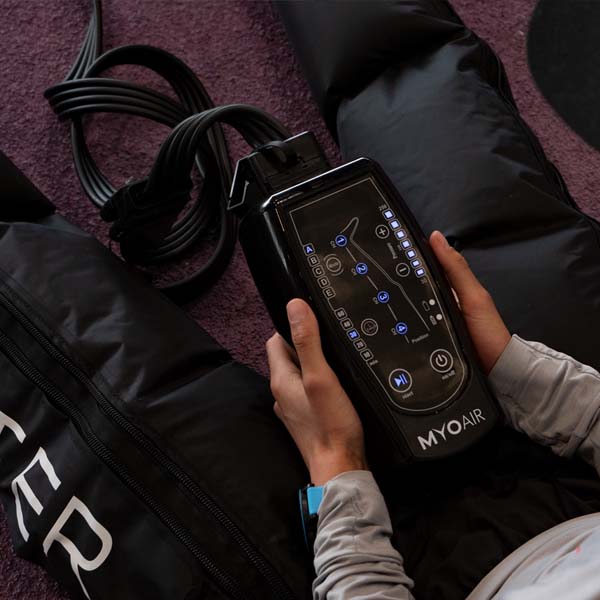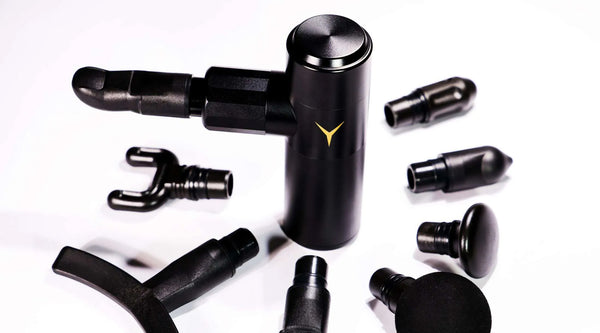If you're training for an endurance event, we know you’ll be pushing yourself to the limits and getting serious about nutrition but are you dedicating the same amount of discipline to your recovery time?
As professional athletes and designers of the MyoPro and MyoLite, we know a thing or two about the importance of recovery. Whatever your sport, recovery should always be central to your preparation and aftercare.
Stay off the sidelines - Recover to prevent injury
Intense training schedules coupled with the repetitive muscle use involved in running long distances, make endurance athletes a prime candidate for injury. Common overuse injuries include medial tibial stress syndrome, achilles tendinopathy and lower extremity stress fractures aka our old friend, shin splints. Any one of these could keep you on the sidelines for weeks, impacting your plans for both competing and training.
As with most things in the body, prevention is better than cure, and the right approach to recovery could protect you from serious injury. After each training session, your body needs ample time to heal before you go again, otherwise the strain you’re putting on your muscles will increase every time you work out - ultimately leading to injury. Multiple rest days are ideal, but in the build up to a competition, that’s not always possible. This is where massage comes in. Massage actively relieves muscle spasms and aids in the pliability of scar tissue, optimising your recovery and helping to reduce the effects of overuse. Regular sports massages are ideal, but you can reap the same injury preventing benefits by using at-home tech, such as the MyoPro after every training session.
Boost your performance - Massage for stamina and strength
For endurance athletes who need to push through the toughest of barriers, physical stamina is everything. So, whilst it might sound counterproductive, trust us when we say that recovery can actually help improve your stamina and strength - just as much as training can.
It can be tempting to hit the training sessions hard in the lead up to a race, pushing yourself a little further each time. And we’re all for that! But what you do post-work out is just as important. If you don’t give your muscles enough opportunity to recover, your performance and stamina building is going to stall due to fatigue, overuse and even burnout. Hydration, nutrition, sleep and myofascial release, through massage all impact how your body responds to exercise. During recovery your immune system works to heal the damage that’s happened to your muscles whilst you were training - and massage will encourage those muscles to come back even stronger. This healing can only happen if you give yourself the time to rest so invest in your recovery time, and you’ll start to notice an improvement in your stamina and strength before you know it.
Have your heart set on winning? - Hydrate for cardiovascular health
Exercise is awesome for your heart, but in endurance athletes, months or years of repetitive impact could lead to a potentially harmful heart condition known as myocardial fibrosis. To avoid this, you want your heart to return to its resting heart rate as soon as possible after training or racing.
The clue is in the name - to get back to a resting-heart-rate, you need to rest. Whilst running is great for improving your cardiovascular health, overdoing it can put a strain on your heart - as well as every other muscle in your body. Taking your recovery seriously can speed up the process of getting your heart rate back to normal. Ensure you're taking it easy between sessions and getting at least 7-9 hours of sleep - especially before or after a race. Hydrating during your recovery period is also crucial for looking after your heart. Studies have shown that your heart rate returns to its pre workout level much faster if you drink fluids during and after intense exercise - so ensure you’re drinking enough in the first few hours following training, and of course stay hydrated during races.
Get your head in the game - Rest for mental resilience
But it doesn’t matter how strong your body is, if your mind is struggling, you’ll never be able to push through those last few miles. Dedicating time to recovery not only gives your body a chance to rest, but it allows your mind to relax too. During races and training sessions, your body is flooded with adrenaline and cortisol. Whilst these hormones play a key role in helping you achieve your fitness goals, when they are at a consistently high level, it can have a detrimental impact on your physical and mental health.
When you’re not training, you want to get your body back into its parasympathetic nervous system - the opposite of fight or flight mode. In this state, your mind and body are able to heal and recover properly, meaning you’ll be sharp and ready to come back mentally and physically fit for your next race. A great way to do this is with active recovery - like yoga or pilates - and massage can even help, by stimulating the vagus nerve down your spine. Research has also proven that getting enough sleep leads to increased performance and mental well-being in athletes, so remember to get plenty of shut eye before taking on your next challenge.










